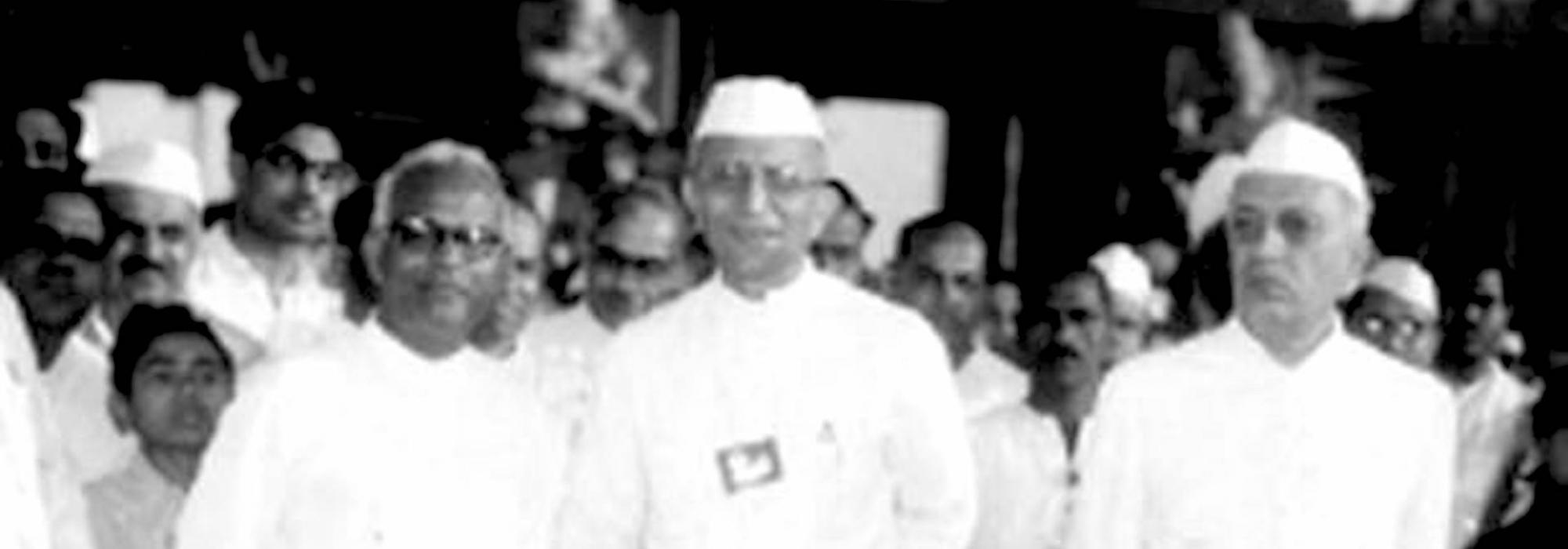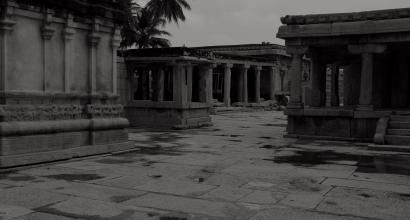Just a year later, the Nehruvian Congress authored the preface to yet another dark chapter that would lead the country to national chaos from which we are yet to recover. This was the notorious 1955 Avadi Session[1] of the Indian National Congress in which Prime Minister Nehru himself gave the indecipherable phrase, “socialistic pattern of society.”
Like the handful of truly national-minded Indians, DVG was immediately alarmed. Needless, his prediction of what would occur under the guise of this perfidious phraseology came true within a decade. Equally, his exposition[2] on its peril remains a classic and ever-relevant. DVG’s piercing intellect first rips off the façade of nobility underlying “socialistic pattern of society” when he writes that the use of this phrase “was in winning the Andhra elections for the Congress.” And then launches a frontal attack on Nehru himself.
When it came to clarifying the meaning of that megaphoned phrase, Mr. Nehru declared that it is not the same thing as Socialism, which itself lacks definition, but a form of organization to be discovered as we go along… how about the darkening of counsel meanwhile?... Viewed against the background of measures like Zamindari abolition and the parrot-talk of nationalization, the phrase "socialistic pattern of society" looked sinister. It spelt disaster to private enterprise and private ownership. It seemed to portend the annihilation of the individual as a distinct human value.
DVG then warns of the long-term dangers of pursuing this course, correctly observing that it would lead to the state monopolizing national resources and the emergence of illegitimate and criminal lobbies, all of which have come true. The ex-Communist, Philip Spratt was unsparing in his analysis[3] of the Avadi Session and the politics and economics of Jawaharlal Nehru:
Nehru is a Communist in this broader sense. He accepts increasing governmental power, socialisation and mechanisation, as both inevitable and desirable. He is strongly attached to the existing Communist governments, and when they clash with other governments he almost invariably supports them… through a series of constitutional amendments, he has systematically cut down the right to property, which most theorists regard as a necessary bulwark…of the other freedoms…Ten years ago the Congress Party was by no means socialistic. When the resolution on the socialistic pattern was passed at Avadi, an important Congressman compared it to the Emperor Akbar's Din Ilahi. Socialism, he said, is Nehru's personal fad, which will quickly be forgotten when he passes from the scene. It seemed a shrewd judgement at the time, but it overlooked the attraction of socialism for a ruling party of hungry careerists. The experience of socialism in the nine years since then has won many Congressmen over.
Elsewhere in his analysis of the implications of the Avadi Session, DVG pointedly asks whether it would be incorrect to call the Congress as totalitarian because of its penchant to crush even those who it merely suspected were rivals. It is redundant to say but it must be said that the aforementioned crushing was carried out using mostly foul means.
By 1964, what the Avadi Session had planted in the political realm began to yield rich harvest in a highly visible manner in the public space: untrammeled and unchecked corruption at all levels. In this context, DVG notes the emergence of a new class: the professional politician, a class non-existent before Independence. He writes that the professional politician was the most corrosive of all and describes[4] this new breed as the “patriotism-professing non-official,” something that the journalist and editor D.F. Karaka echoes[5] more acerbically as the “trader of patriotism.” In DVG’s observation, “our public life today is thus the paradise of the professional politician.” He correctly traces the roots of this corruption to “the day that Congress, the party in power, agreed to let its men in the legislatures vote themselves attractive salaries and perks.” In another essay sardonically titled, How our Legislators Look After Themselves, DVG provides a devastating table showing the exact figures of the salaries that MLAs and MPs awarded themselves at public expense. This he calls, was a sickening betrayal of the “dreams of 1947” towards which millions of service-minded and patriotic Indians selflessly worked. DVG expresses genuine fear at how the “country’s moral stamina” would handle this “new test.”
Leaving nothing to speculation and always devoted to details, DVG delineates a caustic description of the professional politician[6] that the Congress had thrown up in such substantial numbers:
The worst of democracy is in that it brings a profession of politicians into existence. Every profession has its career-side…in order to keep his career going, the politician has to…dive to the bottom of the pond and stir up muck…to the scum which naturally accumulates he must add some of his own imagining so that…[it] may attract people’s attention. Much-raking thus becomes a professional interest…its life is disturbance,—constant, unceasing disturbance…in that process, the mind of the community should be kept torn…You could then be sure of drawing some into your camp and securing their votes. The vote is your living…it opens the way to office or…political influence. Membership to Parliament means assured salary and perquisites. And in order to keep yourself in Parliament you must keep brawling day after day and distract the public over issue after issue…[it] thus throws people’s mind out of balance, and moral issues are never even remembered…The conscience of the community thus is reduced to inertia and stupefaction.
And how did this class of the professional politician fare in its record of nation-building and the actual delivery of governance? DVG provides the brutally honest[7] answer:
Congressmen…mouth promises…But word is not deed, and none of them knows anything of doing except of course for their own dear selves…[They] have for leaders men who failed the country when they held office and are becoming notable as windbags and vote manipulators when out of office.
Sure enough, these windbags and vote manipulators were to have the last laugh, in a manner of speaking. Even as DVG was searing them in issue after issue of Public Affairs with his fiery pen, Mrs Indira Gandhi split the original Indian National Congress and was hurtling down the path to totalitarianism. As we now know, this political Frankenstein would eventually devour her. But back in those days, DVG was among the earliest luminaries who foresaw the ominous signs and the mordant forces that her split had caused. He is unsparing of both the so-called “Syndicate” and “Indicate”[8] remarking that they were cut from the same cloth. More importantly, he notes how both had surrendered to the so-called “Young Turks,” euphemism for a group of young political aspirants who advocated and used unabashed political hooliganism[9] as a shortcut to political office. As DVG predicted, these Young Turks eventually overwhelmed what was left of the original Congress Party, reducing the newly-powerful Indira Gandhi to the status of something slightly better than a puppet of the Communists who now formed her closest circle. The Congress that she had split became swiftly radicalized. It also set in motion the familiar events that would culminate in the Emergency, India’s only brush with dictatorship so far. DVG foresaw this sort of future and wrote these words[10] of friendly but highly sarcastic advice to the Congress Party:
[The Congress] leaders will now be serving the country best by retiring into private life,—to delight…their grandchildren with stories of how they distinguished themselves in their service to the motherland and what miracles they wrought as Ministers and Legislators…It will be to the good of the Congress itself that it should retire from office.
Our greater admiration for DVG lies in the fact that he wrote all these at a time when a majority of influential newspapers and periodicals[11] were vying with one another to curry favour with Indira Gandhi.
To be continued










































